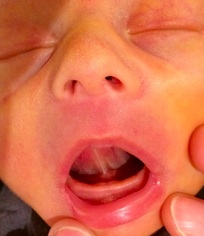 Avoid you and baby feeling this way during the holiday season with these simple tips. Avoid you and baby feeling this way during the holiday season with these simple tips. There is a holiday guide for everything - why not have one for breastfeeding? From holiday clothing to preparations to unsolicited family advice, here are some tips for the holidays. Lets start with the easy stuff; wardrobe. If you are going to find yourself breastfeeding at a holiday event, you might find it easier to wear separates, a shirt and skirt, or pants, something that opens from the top down like a zipper or buttons. If you want to be a little more discreet, consider a shawl or scarf you can place along your breast but not have babies face and head covered (many babies don't like that, making it less than discreet). And you can also make your baby an accessory! Get a ring sling or other handy carrier. They can be easy to nurse in, keeps baby close, helps reduce stimulation, less people to handle baby, gives you both hands and provides a comforting spot for baby to sleep while you enjoy festivities. Engorgement, plugged ducts and mastitis are not holiday visitors anyone wants, but the holidays does see a rise in these sometimes easily avoidable issues. The easiest way to prevent these are to nurse often, take breaks from the busy times, preparation, long travel, & shopping. Nurse often and regularly. The bonus is that the oxytocin flow will help keep you relaxed in what can often be a hectic time. If you are hosting a holiday event, don't over plan and over do it. Ask for people to help. Maybe have a potluck dinner, less decorations and don't be afraid to have a quite place that you can sneak away to if you need. Lots of unsolicited advice seems to come up when we get together with our closest family and friends. They all do mean well, so don't be offended. To help them to also not be offended, practice a polite response, such as, “Thank you for your perspective. We have decided that this is best for our family” or “That’s an interesting idea. We might consider that at a later point”. You might not be telling the truth, but thats ok. Simply ignore what you can. Many hands make light work, but those same hands often want to feed the baby. Try to delegate those hands to change diapers, play, or just cuddle baby between feeds. Most of the time, what mothers eat doesn’t cause too much concern for the breastfed baby, but sometimes we indulge beyond moderation and then it can be concerning. Too much chocolate for example can cause fussiness. Peppermint and sage can have a negative effect on supply, so just be cautious with how many candy canes you have. Also, going to note that it is safe to consume some alcohol when breastfeeding, without the need to pump and bump. General rule of thumb - your breastmilk alcohol content is the same as your blood alcohol content. Generally, a drink or two would be 0.02-0.04% - you can see its not enough to worry about. Enjoy your holidays with your precious little ones! May they bring you the magic of the season.  Multiple times today my attention was called to this article posted by Nancy Mohrbacher that brought an idea that tongue and lip ties are an epidemic. I would suggest reading that article first and then looking at my post. Nancy refers to a study just recently released that was trying to prove that the prevalence of tongue tie is higher than the literature suggests of 0.3%-12% of the population. After seeing the responses on social media I am not convinced that that people are looking at the study for themselves and are drawing conclusions from the title alone. Here is the conclusions of the study. "All but one infant (n=199) had an observable or palpable lingual frenulum that was Coryllos type 1 (n=5), type 2 or 3 (n=147), or type 4 (n=47). Although our study was not powered enough to test for any correlation between the cessation of breastfeeding and the type of frenulum, we found no statistical correlation between the Coryllos type of lingual frenulum and the presence of breastfeeding difficulties. CONCLUSIONS: A lingual frenulum is a normal anatomical finding whose insertion point and Coryllos classification are not correlated with breastfeeding difficulties. We suggest that the term "lingual frenulum" should be used for anatomical description and that the term "tongue-tie" be reserved for a lingual frenulum associated with breastfeeding difficulties in newborns." A valid point - A frenum present/observed is not a tie. And there is no correlation between type of "grading" and breastfeeding concerns. In fact, this is why some of us professionals skilled in tethered oral tissues want to eliminate the terms and grading and why I, in my practice, do not use a grading system. (I do have tools and assessments) Moms ask me a lot what class it is - they get this idea from the internet. It is easy to understand a range of 1-4, or anterior or posterior. I will not attempt to grade it because implies one type of restriction is more problematic than another and this might not be the case. It is a little bit harder to comprehend structure and function, central nervous system and how it all plays into feeding. So, I don't blame moms for wanting a simplified tool. The truth is we don't have that. It also seems like grading can validate decisions, to treat or not, based on a grade. "The IBCLC said it is a severe tie and I had to fix it" or "it was just mild so I didn't need to fix it" are examples of what we might hear from most given a grade. Part of the grading is simply for documentation purpose if a revision is done. It is like taking a before picture without the picture. The surgeons preforming frenecomies need a way to document what they see and what they performed. This study looked at infants at days 0-3 and then a follow up at two weeks, by telephone. The lingual frenula of 200 healthy infants were evaluated by visual examination and palpation within the first 3 days after delivery. The frenulum was categorized according to the four Coryllos classifications. Each infant's mother responded, immediately after the examination, to a structured questionnaire on the quality and type of feeding. An additional structured telephone interview with the 179 breastfeeding mothers was conducted 2 weeks later. This raises some questions for me: Is day 0-3 too early to show concerns? Yes, in many cases it is. What we know from the study is 3-4% of the babies had issues they considered to be from ties. But we don't know if all the others were completely asymptomatic after the 3 days or after the two weeks. Are we considering any infants that did have breastfeeding problems to be something other than restricted tissues? This is an unknown. Is breastfeeding established in the first two weeks? No, it is not. What about later onset of issues? So, revisiting the earlier question, we don't know beyond the 3-4% that has issues in the early days if others had issues. There are quite a few symptoms of tongue ties that show up later, like secondary low milk supply, reoccurring mastitis, weight gain concerns, inability to swallow solids foods. There are many symptoms. Too many to list in this blog post. Is two weeks normal term breastfeeding and the optimal goal? No, World Health Organization and the Canadian Paediatric Society recommended breastfeeding for two years. Many undiagnosed tongue tie babies are reported to self wean between 6 & 9 months. Do they intend to follow up longer? This is an unknown. There were 200 assessments done, but only 179 telephone calls made at 2 weeks; what happened with the other 21 dyads? Did they stop breastfeeding (perhaps due to issues)? Again, another unknown. While on the subject of tongue and lip ties on social media in response to this treatment came up, multiple times, and Nancy discusses it in her post as well. We need to be very through in evaluation and looking at the root causes of the problems. We need to seek out the people knowledgeable to do such an evaluation. Depending on where moms live these resources might be abundant or they might be scarce. There is so much to consider when it comes to breastfeeding that we cannot latch on to one specific if things are not going ok. It is often a cascade of things. Sometimes it is partly mom, sometimes partly baby…it is a little like detective work at times. Breastfeeding is fluid and holistic. There are many considerations and options before revision & revisions are not a quick end to the concerns dyads have. One example of what I mean is considering moms anatomy/function when looking at ties. It is a bit like puzzle pieces. A tongue tied baby might not have any issues with a mother with one sort of breast and might with another (think about wet nursing, or even babies who do well on one side and not on another). My clients get presented all kinds of options. We start with what can we do today, right now, to make this better and manageable and tolerable so we can even get to a place of discussing long lasting breastfeeding. Often by the times I see moms I am getting told is "YOU have to fix this or else I QUIT". No pressure. But when a mom is looking quitting in the face, I need to give her some right now options, but also get her as far away as quitting as I can before I leave her because it I don't she is right back at looking quitting in the face. That is why consults are so through and a big plan is made - a right now, a week from now and longer term. So, when I see restricted oral tissues, do I let clients know? Yes! Even when I'm not 100% sure that is the issue, I mention it because moms don't always come back for follow up so I cannot assume that after they try tricks 1, 2 and 3 for a week, and come back so we can reassess. If I don't tell them they might never be told or if the tricks don't work and nothing resolves they are left feeling like it was a failure and give up. If they know that there are things that could work, BUT, if they don't we need to consider the restrictions to having an impact, they are informed. If I see moms early in the process (like day 0-3 when issues might not be noticeable yet) and I can see some red flags I also mention things to just watch for, just as an FYI, because it could become a larger issue. There is also a lot of myths that need to be busted, such as breastfeeding just hurts for the first few weeks, that can be related to ties, so they get overlooked and the problem spirals. Does it mean sometimes moms latch on to that idea and run with it? Yes, sometimes it does. I try to limit that by being very upfront and through in the discussions. I don't get much done in 15 minutes - this is why consults take as much time as they do. History, assessments, evaluations and then discussion takes time. Mentioning it doesn't make me a poor clinician & tongue tie happy (trust me, I dislike them, a lot, and my work would be far easier without them). It does make me through and ensure that my clients are getting a full assessment, not just get a superficial look and a pat on the back that things will get better, that breastfeeding just takes 6-8 weeks to get used to and if they just stick it out it will be worth it. How many times have you heard a mom be told to take some herbs, eat some cookies and drink some beer? That would be fantastic if that is all it took to make breastfeeding easier. But that isn't the truth. Keep in mind, before we had providers who could release ties longer term, we had strategies to deal with breastfeeding concerns. The ability to now release ties doesn't negate or remove these strategies. Why are we not simply just sticking the golden oldies? Because they don't work for everyone, they don't always get people to normal term breastfeeding before they become too overwhelming or exhausting. Because babies are highly adaptable and will compensate and these compensations are not necessarily good for babies and can cause longer term life and health issues. Breastfeeding is linked to so much health wise and it seems like it is acceptable to mention that breastfeeding lowers the rates of commonly known health issues, such as diabetes and asthma, but isn't yet acceptable to say the same things that can cause breastfeeding issues can also cause issues with dental, speech or breathing. I think there are good points to be taken but I think there are gaps in this study and article. Balance needs to be strived for. |
Kim Smith
|
 RSS Feed
RSS Feed
